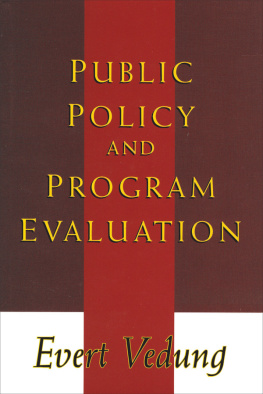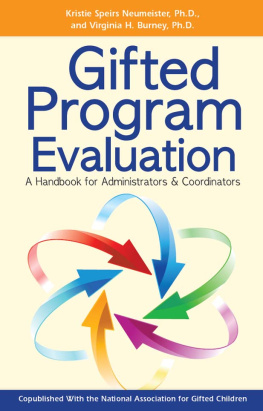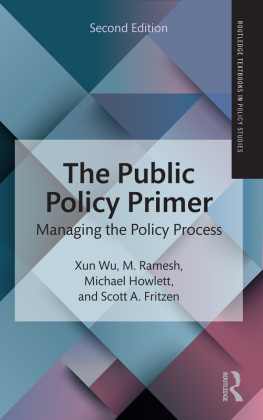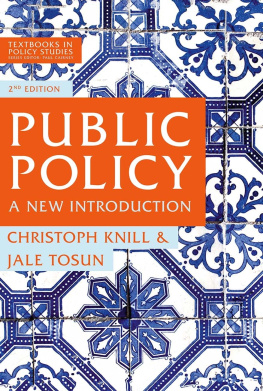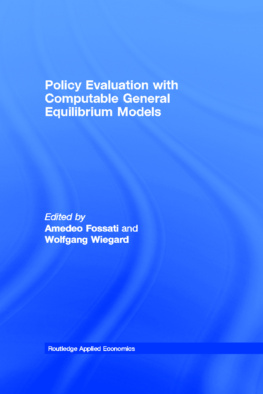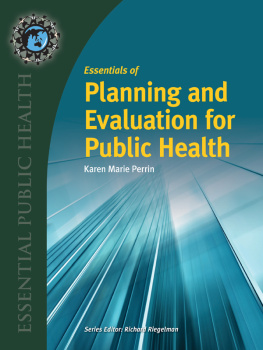First published 1997 by Transaction Publishers
Published 2017 by Routledge
2 Park Square, Milton Park, Abingdon, Oxon OX14 4RN
711 Third Avenue, New York, NY 10017, USA
Routledge is an imprint of the Taylor & Francis Group, an informa business
Copyright 1997 by Taylor & Francis.
All rights reserved. No part of this book may be reprinted or reproduced or utilised in any form or by any electronic, mechanical, or other means, now known or hereafter invented, including photocopying and recording, or in any information storage or retrieval system, without permission in writing from the publishers.
Notice:
Product or corporate names may be trademarks or registered trademarks, and are used only for identification and explanation without intent to infringe.
Library of Congress Catalog Number: 96-52816
Library of Congress Cataloging-in-Publication Data
Vedung, Evert, 1938
[Utvrdering i politik och frvaltning. English]
Public policy and program evaluation / Evert Vedung.
p. cm.
Includes bibliographical references and index.
ISBN 0-7658-0687-8 (paper : alk. paper)
1. Political planning. 2. Political planningEvaluation. 3. Policy sciences. I. Title.
H97.V4313 1997
320.6dc21 96-52816
CIP
ISBN 13: 978-0-7658-0687-1 (pbk)
The Simple System Model
The System Model Adapted to Government Intervention Evaluation
Evaluation According to the Spinning Top Model
Evaluation in the General Governance Model
Metaevaluation: Evaluation of Evaluation
Radical Rationalism
Management by Objectives
Models of Evaluation
Goal-Attainment Evaluation
Side-Effects Evaluation
Main Effects, Null Effects, Perverse Effects, and Side Effects
Side-Effects Evaluation with Specified Side Effects
Goal-Free Evaluation
Comprehensive Evaluation: The Generic Countenance Model
Stakeholders in Public Interventions and Their Evaluation
Productivity
Efficiency as Cost-Benefit and Cost-Effectiveness
Dual Loyalties in the Chain of Public Representation
External and Internal Evaluation
External Producers of Evaluation
Policy Instruments: Regulations, Economic Means, Information
Prohibitions Ordered According to the Strength of the Exceptions
Some Elementary Types of Economic Tools of Government
The Fuel Declarations Envisioned Implementation Chain
Prerequisites to be Fulfilled if the Fuel Declaration is to Work
The Impact Problem in Counterfactual Terms
Evaluation Research Designs for Illumination of Causal Impact
Classic Experiment with Pre- and Postprogram Measurements
The Rossi and Freeman Algorithm for Effect Calculation in Randomized Experimentation
Five Types of Randomized Experimentation
The Solomon Four-Group Design Applied to an Energy Campaign
Experiment Without Formal Preprogram Measurementthe Postprogram-Only Control Group Design
Two Types of Matched Controls
Theory of the Household Energy Conservation Intervention Field
Two Quasi Experiments
Two Reflexive Controls Designs Interrupted Time-Series and One-Group, Before-and-AfterAs Amputated Quasi Experiments
Shadow Controls: Data Sources and Appropriate Questions
Explanatory Factors in Process Evaluation
Policy Obscurity
Motives for Public Policy Obscurity
An Intervention Theory
Criteria of Merit for Effectiveness Evaluation
Four Important Criteria of Merit in Program Evaluation
The Engineering Model for Utilization of Evaluation
Learning Theory and Dissonance-Attribution Theory
Response Steps in Communication Processes
Strategies to Enhance Utilization of Evaluation
The Diffusion-Centered Strategy: The Reporting Method
In August, 1991, I stayed for a couple of nights at the Bildungshaus Sankt Virgil in Salzburg. In the lobby I found a postcard that read in German: Our life is the history of our encounters. This adage captures important events in the developments that have led to the publication of this book in English.
It all began in 1985 in a workshop on evaluation in Barcelona, arranged by the European Consortium of Political Research, where I presented some ideas from a Swedish manuscript of mine on public policy assessment. In the sessions, I had the exceptional luck of encountering Professor Peter Gerlich, who one year later unexpectedly invited me to lecture at the Vienna University International Summer School, located in the picturesque Alpine village of Strobl am Wolf-gangsee, not far from the illustrious Gasthaus Im Weissen Rssi, made famous by Benatzky in the operetta. I decided to teach administrative control and public policy evaluation and have the rest of my unfinished Swedish manuscript translated into English. The 1987 course was repeated in 1989 and 1991.
Before my first visit to Vienna University, however, I had another unexpected opportunity to improve my English manuscript. This happened after the Barcelona meeting in the late fall of 1985, when I taught at the Kyung Hee Universitys recently inaugurated Graduate Institute of Peace Studies in the Kyonggi Province outside Seoul, Korea. Behind this invitation were Professor Sookon Kim, Professor KwanBong Kim, and Chancellor YoungSeek Choue. The first trip to Korea was followed by two more, in 1988 and 1990, arranged by, among others, Professor Sungchul Yang. Also, I further expanded and rewrote my English manuscript in a room in the Bursa im. st. Pigonia on Ulica Garbarska, Cracow, during short sojourns between 1987 and 1991, partly supported by the exchange program between the Uppsala and Jagiellonian universities in the Office of International Affairs, Uppsala, and organized by my good friend and colleague Professor Marian Grzybowski of the Jagiellonian Universitys Political Science Department.
When I received my fourth invitation from Kyung Hee University to teach in the spring semester of 1994, I decided to finish the manuscript and try to find an English publisher. Since the Swedish book was issued already in 1991, the English version that took form on the flowering Kwangnung campus turned out to be a very different work. The last point should be emphasized: the present work is not a mere translation of my 1991 Swedish book, but an entirely revised product.
Through the years, excellent computer literati in Uppsala and Seoul have helped me to install and taught me to use several versions of WordPerfect and PC Tools. In particular I wish to acknowledge the invaluable assistance of Woonho Kim, Soon Park Park, Joonju Yoon, and Youngchul Kim, all of Kyung Hee University. Dean Yoonhee Suh, Rector Sungkuk Lew, and Rector Jae Shik Sohn provided material and moral support. In addition, I take this opportunity to recognize the invaluable help of Pour MitrahiBijn in matters of copying, telefaxing, and mailing, and of my Uppsala colleague Anders Westholm and my competent and spirited brother Tage Vedung in computer matters. The latter has altruistically worked for nights and days to provide the manuscript in camera-ready form.


